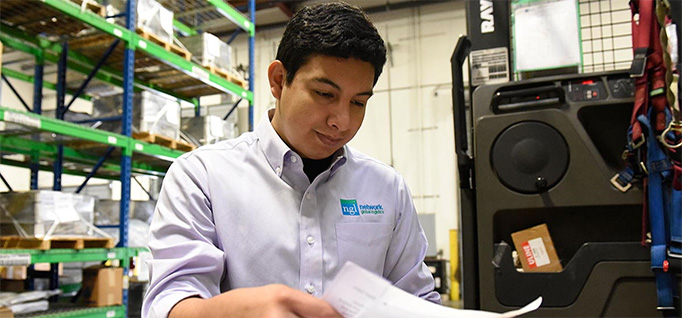Keeping Pacific Rim economies humming
By Grace Singh Smith
August 24, 2016
Degree and certificate programs at Santa Monica College are filling the logistics pipeline with qualified applicants.
California is the nation’s primary driver of job creation in the field of global trade and logistics (GTL). Los Angeles and Long Beach, the nation’s two largest ports, are gateways to the Pacific Rim economies. And with easy access to freight services via the Alameda Corridor, Southern California is a key logistics hub for more than 40 percent of all goods brought into the U.S., according to the Los Angeles County Economic Development Corporation (LAEDC).
“Logistics is supply chain, transportation, distribution and operations management,” says Sal Veas, chair of the business department at Santa Monica College (SMC). “Simply put, logistics looks at how an item and its parts came to be one, got packaged, got delivered and arrived to you as you ordered it, on a timely basis.”
At least 47,000 California firms employ more than three million people in logistics/supply chain activities. In the next three years, another 12,900 jobs in logistics are expected to be created. With its associate degree and certificates in GTL and international business — and courses offered through both traditional and online classes — SMC is well positioned to help supply that pipeline with qualified applicants.
Advancing or changing careers
SMC is part of the recently formed Pathways Regional Opportunities: Global Trade and Logistics (PRO-GTL) Consortia, a partnership between private industry and seven community colleges in Los Angeles and Orange Counties to promote career opportunities in global trade, e-commerce, logistics and global entrepreneurship.
“We have international students and some from local high schools — and our night classes bring in entrepreneurs who have their own business and want to learn about exporting to other countries,” says SMC Business instructor Katya Rodriguez, who teaches principles of logistics, supply chain management, import/export and introduction to business.
Beyond those already in the field who want to advance in their careers, SMC attracts students in other fields looking to changes careers. An example is SMC student Nelson Rivas, who now works as an account representative with a third-party logistics company that provides critical inventory, distribution and transportation services to high-tech and medical companies.
“I was working in another field, when I began looking at the possibility of making a career change,” he says. “I enrolled in Katya Rodriguez’s logistics class, and that’s pretty much what started all this for me.”
While he is working toward the certificate, Rivas would like to get an associate degree with a focus on logistics and supply chain management, and maybe transfer to California State University, Long Beach.
A wider team effort
To help California’s economy grow, the state and its community college system have made career technical education and closing the skills gap a priority for building a skilled 21st-century workforce.
The PRO-GTL Consortia is one facet of that commitment, aiming to align curriculum among the partner schools, and engaging industry to bring real-world opportunities to students. One of the benefits of being a PRO-GTL partner is that students can take courses not offered at SMC at a partner institution.
SMC also offers more than just classroom training. In addition to her professional background, instructor Katya Rodriguez has earned several certifications from industry and trade associations, giving her access to top companies and their contacts. She puts these connections to use, offering her students the chance to network, and exposing them to real-life jobs.
“It’s not like accounting, where adding up numbers can be taught in a classroom,” Rodriguez says. “Students need both theory and experience. As a member of the Council of Supply Chain Management, I’m allowed to invite students to an annual global conference, where they can network with executives and people in the industry. I bring them to companies like Cool Pak, where after a tour of their plant, I asked the owner if they offered an internship. Two of our students went to interview for it, and ended up getting hired instead.”
To learn more, read the full article at Community College Daily.
Continue the conversation on our LinkedIn group.



